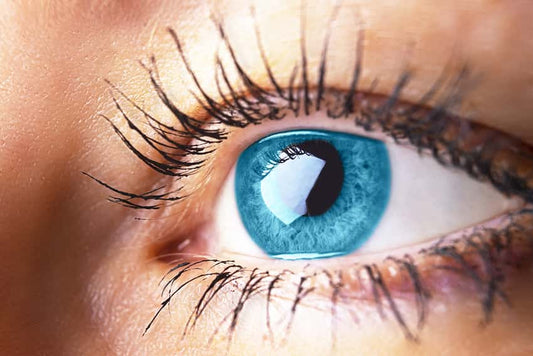Vitamins play a big role in how our body functions, making sure every aspect of our health is the best it can be. Our eyes are a major part of this as they are the most significant of your five senses.
As you grow older, you need a precise balance of vitamins to help keep your vision and eyes functioning optimally. A deficiency of any vitamin can put you at a higher risk of developing blurry vision, certain eye diseases, or dry eyes.
Blurry vision can happen for a wide range of reasons, besides just normal vision changes. Diseases like age-related macular degeneration, cataracts, and glaucoma can cause blurry vision, and may even lead to blindness if left unaddressed.
Many of these diseases are related to and are greatly affected by, your intake of certain vitamins, or lack of.
While vitamins won’t cure these diseases once they are already progressing, making sure you get the recommended amount of each vitamin daily will help prevent these diseases from starting or help slow their progression.
All the vitamins we are going to discuss play many roles in our body and work together to provide the most benefits for your eyes and their health!
We will be covering nutrients such as vitamins A, B, C, D, and E, and minerals lutein, zeaxanthin, and zinc, all playing a significant role in eye health.
Best Vitamins for Blurry Vision and Eye Health
Vitamin A
Vitamin A is found in food in the form of beta-carotene, and when we eat it, our body transforms it into vitamin A for it to be utilized in multiple ways. While we use vitamin A for many body processes, the majority of it goes towards helping our eyes!
The front part of your eye is called the cornea, and the back part is called the retina. A deficiency of vitamin A causes harm to both the cornea and retina because it helps to produce the pigments that make these parts of your eyes function properly.
This can lead to blurry vision, aside from normal vision changes, as your eye cannot process what you are seeing properly. Vitamin A also greatly affects how well you can see in low light and at night, so making sure you’re getting enough will benefit you all day and night!
It is recommended to consume 0.8mg of vitamin A per day to contribute to the normal functioning of the eyes. It will also help to maintain the mucous membranes of your eyes, protecting them from bacteria and viruses and keeping them moist.
The best sources of vitamin A include yellow and orange foods, such as sweet potatoes, pumpkin, carrots, eggs, and cottage cheese.
B-complex
The B vitamins include a complex of 8 vitamins, but three of them are particularly important for vision and eye health: B6, B12, B9 (folic acid).
These three vitamins play a role in helping to prevent age-related macular degeneration (AMD). In AMD, your retina breaks down over time, leading to blurred vision that can progress quickly, potentially leading to complete blindness as you get older.1
An acid found in your body; homocysteine can be a risk factor for AMD when found in high amounts. B-vitamins help to reduce and normalize blood levels of homocysteine, protecting your retinas and vision.
Deficiency in certain B-vitamins can also lead to the disruption of the optic nerve signals to your brain, which can lead to blurry vision and blind spots.
Sources of B6, B12, and B9 include peanuts, chicken, soybeans, oats, spinach, and oranges.
Vitamin C
One of the biggest causes of blurry vision as you age is cataracts. These are cloudy areas that develop on the lens of your eye, causing blurry vision and blind spots.
An adequate intake of Vitamin C leads to a lower risk of developing cataracts as you get older. This is because vitamin C has antioxidant properties, which help to seek out damaging cells (free radicals) and destroy them before they can cause damage to your body.
Cataracts are a form of damaging radical cells that can develop in your eyes.2 It’s recommended that you get 60-90 mg per day of vitamin C to help prevent cataracts as you age.
Vitamin C can also help protect you from AMD as it strengthens the blood vessels in your eyes connecting to your retina, making your retinas stronger to fight back against AMD.
Sources of vitamin C include bell pepper, strawberry, orange, broccoli, spinach, bilberries, and citrus fruits.
Related Post: Vitamin C and Dry Eyes
Vitamin D
We all know that vitamin D comes from the sun and can help our mood, but did you know it also protects your eyes? Like the B complex vitamins, Vitamin D helps to protect our eyes from AMD as well as keep your eyes moist to avoid dry eyes and blurry vision.
Vitamin D is also an anti-inflammatory, helping reduce inflammation on the surface of the eyes and maintaining their moisture. Dry eyes can lead to more bacteria entering your eyes, as the layer of moist mucus blocks the bacteria from entering, thus affecting your eye function.
When your eyes are dry, your vision becomes blurry. If you’ve ever worn contacts, you’ve probably experienced this when they get dried out at the end of the day, making it uncomfortable and more difficult to see.
Adequate intake or supplementation of vitamin D can help ease symptoms of dry eyes. Besides the sunlight, sources of Vitamin D include mushrooms, egg yolks, cheese, and oily fish, like salmon.
Vitamin E
Alpha-tocopherol is one of the active antioxidants in vitamin E that helps fight the damaging free radicals in your body.
Vitamin E specifically helps to fight the damaging cells that attack the proteins in our eyes. If this protein gets attacked and damaged, it leads to a cloudy cataract in your eye, which blocks your vision.2
A deficiency of vitamin E leads to the light receptors in your retinas becoming weakened, which causes blurry vision and vision loss. Vitamin E works best for your eyes when combined with Vitamin C, beta carotene, and zinc.
Vitamin E sources include peanuts, hazelnuts, almonds, sunflower, soybean oil, and corn oil.
Best Minerals for Blurry Vision and Eye Health
Lutein and Zeaxanthin
Lutein and Zeaxanthin are carotenoids; pigments produced by plants that contain high amounts of antioxidants. They are usually found in green, orange, and yellow-colored fruits, as carotenoids give these fruits their vibrant color.
The main part of the eye they affect is the macula, which is the part of the eye that controls how good or bad our vision is, and also colorblindness.4
Lutein and zeaxanthin protect our eyes from damaging free radicals from the blue light emitted from electronic devices. Sources include any green, orange, or yellow pigmented foods like carrots, kale, broccoli, and sweet potato.
Zinc
Zinc is an important mineral for eye health because it helps support the vitamins listed above, specifically vitamin A. Zinc allows vitamin A to move from the liver, where it is processed to the retina for use by your eye.
Once in the retina, it assists in the production of melanin to help protect the eyes from harmful UV light.4 Zinc is also important for those at risk for AMD as it is an antioxidant that can help prevent the free radical damage that causes AMD.
Around 40-80mg of zinc is recommended each day to help prevent and slow AMD progression. Zinc sources include oysters, chickpeas, legumes, pumpkin, almonds, chicken, and beef.
Supplements for Blurry Vision
You should always consult your ophthalmologist if you are experiencing blurry eyes, but if there are no signs of eye diseases, then it may be best to look at your vitamin intake!
Blurry vision that is caused by vitamin deficiencies can improve and even go back to normal when the deficiency is treated. As previously mentioned, vitamins work best for your eyes when taken altogether, so look for a multivitamin that contains them all.
If you do have macular degeneration or cataracts present, a prescription-strength vitamin may be available alongside other recommended treatments.3 Though, it's always best to consult your doctor if you suspect you have any vitamin deficiencies or eye health issues.
If you want to help maintain good eye health through taking a natural supplement, our top pick is Performance Lab Vision!
This formula contains vitamins A, B, C, D, and E to provide the best support for your eyes. It can also provide enhanced focus speed, motion detection, night vision, less blurriness, and protection from harmful blue light!
References
- Meagen M. McCusker, Khayyam Durrani, Michael J. Payette, Jeanine Suchecki, An eye on nutrition: The role of vitamins, essential fatty acids, and antioxidants in age-related macular degeneration, dry eye syndrome, and cataracts. Clinics in Dermatology.2106;34(2):276-285.
- William G Christen, J. Micheal Gaziano, Charles H Hennekens. Design of Physicians’ Health Study II-A Randomized Trial of Beta-Carotene, Vitamins E and C, and Multivitamins, in Prevention of Cancer, Cardiovascular Disease, and Eye Disease, and Review of Results of Completed Trials. Annals of Epidemiology.2000;10(2):125-134.
- Mares JA, La Rowe TL, Blodi BA. Doctor, What Vitamins Should I Take For My Eyes? Arch Opthalmol.2004; 122(4):628-635.
- Bruce H. Grahn, Phyllis G. Patterson, Katherine T. Gottschall-Pass & Zhen Zhang. Zinc and the Eye. Journal of the American College of Nutrition.2001;20(2):106-118.















